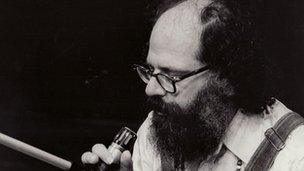School of Art awarded grant to probe 'Glasgow Miracle'
- Published
Billy Connolly appeared at the Third Eye Centre in Glasgow in the 1970s
Glasgow School of Art is to get one of the largest grants of its type to work out why the city has produced so many successful contemporary artists.
The money - £122,500 - will be used to investigate an archive of photos and recordings dating back three decades.
It is hoped it will help shed light on what conditions and events led to what one curator has dubbed "The Glasgow Miracle".
The cash has been awarded by the Arts and Humanities Research Council (AHRC).
It was a German curator who first coined the phrase "Glasgow Miracle" to explain the stream of successful contemporary artists coming out of the city.
Experts believe more practical measures could be at play. They cite strong teaching, cheap studio space and a cluster of artists in one area of the city.
The grant will be used to archive two significant collections of photographs and articles - many of them at the former Third Eye Centre where everyone from Billy Connolly, Miles Davis and Damien Hirst have appeared over the years.
A series of person-to-person interviews with artists who have made Glasgow an internationally recognised centre of visual arts will be also be carried out
Researchers said as well as helping them understand the origins of the city's successful scene, it may help with future investment.
The project will be done in partnership with the Centre for Contemporary Arts (CCA), where a series of public presentations of aspects of the archives will be made.
Prof Seona Reid, director of the Glasgow School of Art, said: "Glasgow currently has one of the most active art-scenes in Europe producing artists of international significance and attracting many more to study and live in the city.

American poet Allen Ginsberg, one the Beat generation, also appeared at the Third Eye Centre
"The AHRC grant will enable the GSA and the CCA to investigate the evidence of the last 30 years and to unlock some of the secrets of the 'Glasgow Miracle' and the subsequent building of a local arts infrastructure."
CCA director Francis McKee added: "We are in a unique position of having access to both the critical historical sources as well as many of the relevant artists themselves.
"Our approach to the investigation brings together for the first time a range of evidence including the physical - objects, artefacts and documentation - and the ephemeral - aspirations, reflections and memories.
"Using these we hope to help define some of the key events, exhibitions and networks underlying the Glasgow contemporary art scene and enable past events to signpost future activity."
- Published15 November 2011
- Published17 September 2010